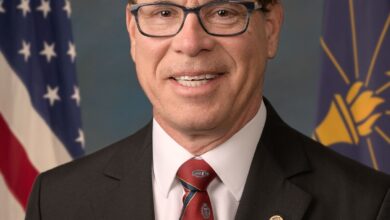
Questions Linger Over Indiana’s Proposed Diploma
The new high school graduation requirements must be approved by the end of the year, but so far, some details are still up in the air.
by Casey Smith, Indiana Capital Chronicle
August 21, 2024
A revamped high school diploma model proposed by Indiana education officials appears to have earned approval from the state’s higher education institutions and several school advocacy groups, but others around the state — including parents, teachers, business owners and lawmakers — say they still have questions about the plan.
Many said their support hinges on unreleased — or uncertain — details about post-graduation outcomes, financial impact, and the feasibility of widespread work-based learning.
“While parts of the proposal appear to be a step in the right direction, this updated diploma proposal remains a major change that high school students, educators and counselors must adjust to,” said Rep. Cherrish Pryor, D-Indianapolis, in a Tuesday statement.
“There are still many unanswered questions about the work-based learning requirements,” Pryor continued. “For example, who will pay for student transportation? How will school counselors handle the increase in workload in the midst of a counselor shortage? At the end of the day, this is an unfunded mandate that will unfairly burden our chronically underfunded public schools.”
Under a law passed by Indiana legislators in 2023, the state must adopt new diploma requirements by December.
Schools could choose to opt in and start offering the new diplomas as early as the 2025-26 academic year. The new diplomas will take effect for all Hoosier students beginning with the Class of 2029, who are entering eighth grade this fall.
Paramount to the new plan, according to state officials, is maximized “flexibility” for students to personalize learning pathways and experiences, including with college courses taken while still in high school, as well as the ability to count internships, apprenticeships, military experience and other work-based learning toward their graduation requirements.
What we know
While the plan answers repeated calls for the state’s curriculum to better prepare students for post-high school employment and boost the state’s declining college-going rate, the drafting process has garnered criticisms — although some concerns have since been reversed — and a mounting pool of questions.
In the first draft of the diploma redesign — released earlier this year — high school students in public and private schools across Indiana would have earned a “GPS Diploma” or “GPS Diploma Plus.”
That plan was scrapped, however, following waves of criticism from Hoosier teachers, parents and students who worried that the model would broadly exclude certain course requirements, like those in history, foreign language and fine arts.
The second diploma structure, unveiled during a State Board of Education meeting last week, includes a baseline diploma, with minimum requirements for all students.
The baseline differs slightly from the current Core 40 diploma, requiring 42 credits instead of 40. Students would then have flexibility to choose classes above that to earn “readiness seals” for enrollment, employment or enlistment that correspond with their future path of continued higher education, workforce or military service.
Depending on the type of schedule a student is on — traditional seven periods or blocks — they can earn between 56 and 64 credits.
Although officials at multiple Indiana colleges and universities had warned that the previously proposed high school diplomas would not meet university admission requirements, the new model now has support from leadership at Ball State, Indiana, Indiana State and Purdue universities, as well as Ivy Tech Community College.
The state education board also received letters of support from the Indiana Association of Public School Superintendents, the Indiana Association of School Principals and the Indiana School Counselor Association.
“The (proposed) diploma requirements … not only meet the academic rigor that we expect from our Indiana high schools, but go beyond that rigor and include individualized flexibility,” said Bob Taylor, executive director of the Indiana Association of Public Schools, which represents over 290 public school superintendents.
Todd Bess, executive director of the Indiana Association of School Principals, said he’s additionally pleased with the new proposal.
“I’m confident in our principals and all of our school leaders to implement, and, I’ll say it again, innovate with this,” Bess said. “We will lead in this space.”
Looming questions
Keith Gambill, president of the Indiana State Teachers Association, said the state’s largest teachers union is pleased that education officials addressed educators’ concerns about the earlier plan, but he emphasized there is still room for improvement.
Indiana officials make major updates to new high school diploma plan — earning higher ed support
“ISTA is encouraged by the positive changes reflected in the Indiana State Board of Education’s revised draft of the high school redesign and diploma requirements,” Gambill said in the statement. “The incorporation of educator input into this new draft is a significant step forward, demonstrating that the voices of educators and community members have been heard and valued.”
Legislators — mostly Democrats — have also cautioned that some pending degree requirements pose more questions than answers.
The Indiana Black Legislative Caucus, for example, specifically raised questions about how students are expected to accrue outside work hours on top of their coursework, and whether transportation will be provided for students from school to apprenticeships.
They asked, too, who will be tasked with facilitating connections between businesses and students, pointing to recent data showing that Indiana has a dismal 694 to 1 student-to-counselor ratio. “Will counselors still be expected to take on this role irrespective of this shortage?” the caucus asked earlier this summer.
And while numerous Hoosier employers said they welcome the opportunity for work-based learning, some lawmakers, education advocates and business leaders are calling on the state education board to hash out specific details.
Still unclear is whether Indiana has enough businesses with open positions to accommodate all interested high school students, as well as possible liability issues that come with employing minors.
Additionally, Hoosiers from rural regions in the state said they want to see better incentives — and increased safety protocols in place — for businesses that hire students.
Indiana Secretary of Education Katie Jenner said certain diploma plan details — especially regarding work-based learning — are still being developed by the Indiana Department of Education and a variety of stakeholders.
Even so, the diploma overhaul will have to be approved before state lawmakers reconvene for the 2025 session. Any state-sponsored funding decisions or incentives for businesses will have to determined by the General Assembly.
Rep. Chris Campbell, D-West Lafayette, said she’s still “a little bit concerned” that foreign language, fine arts and world history “are not necessarily required,” and pointed out that the current proposed degree plan could “still put burden on our counselors in making sure that kids are on the right track.”
“I’m going to continue to talk to teachers in my community, families and parents that I know are very, very concerned about what the future holds for their kids, and want to make sure that we don’t have a one-size-fits-all,” she Campbell said.
Bartell Berg, a professor of German at the University of Southern Indiana and vice president of the Indiana’s chapter of the American Association of Teachers of German, echoed those concerns, saying he worries that students will be “pigeon-holed” into just one readiness seal.
“It is part of the beauty of our public education system that I took history and languages with friends who became firefighters and engineers, teachers, pastors, manufacturers and entrepreneurs, ”Berg said. “It’s my fear that the new pathways – that de-emphasize languages, world geography, and to some extent, even higher-level math skills — will leave my children and their peers unprepared to compete and excel in a 21st century economy. We need citizens, soldiers and workers that have greater intercultural competence, not less.”
State education officials have not yet published the diploma plan in the state register. Once that happens, another 30-day public comment period will open, during which the state education board is expected to hold several in-person hearings and accept feedback online.
Changes can still be made after the comment period and before final adoption by the board, but the final rule on the new diploma must be adopted by Dec. 31.
GET THE MORNING HEADLINES DELIVERED TO YOUR INBOX
Indiana Capital Chronicle is part of States Newsroom, a nonprofit news network supported by grants and a coalition of donors as a 501c(3) public charity. Indiana Capital Chronicle maintains editorial independence. Contact Editor Niki Kelly for questions: info@indianacapitalchronicle.com. Follow Indiana Capital Chronicle on Facebook and X.






